Part 2: I call newbie runners 'tomatoes' because they get turned into chunky salsa
I call newbie runners 'tomatoes' because they get turned into chunky salsaFortunately for our character, he does all his decking from the comforts of home. Unfortunately, he can still die. But he has to exist first:
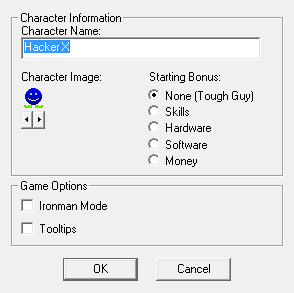
The actual character options are pretty barebones. You pick a name, which you'll basically never seen, and an icon, which will represent you in the Matrix. Without a Starting Bonus on the right, you'll start with all your skills, hardware, and software at rating 1, and with 100 nuyen in your pocket. Each bonus will double the rating for the given option from 1 to 2, or for money, increase your starting nuyen to 2,000. Ironman Mode makes the game play like a traditional roguelike, marking your save file on death so you can't reload and try again.
In honor of the setting, let's give our character an appropriate name:
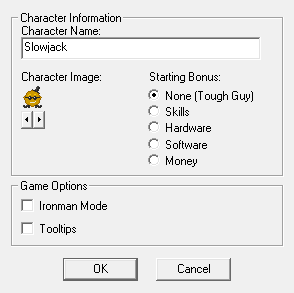
That should do for our tomato. I'm leaving Ironman mode off for now; I don't think I'll die, but if I do, I'll leave it up to the thread to decide if I should just load a save, or start a new, more specialized (or differently specialized) character.
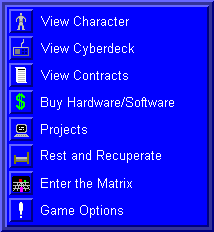
This is the main menu of the game. You'll be seeing this a lot if you play, though not as much as the Matrix itself. So let's go down the list.
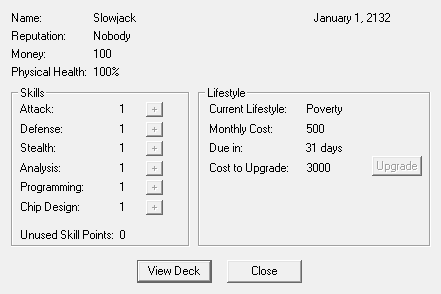
Here we have our stats. Name and Money are obvious, and Physical Health is probably obvious. Our Reputation reflects how good a decker we seem to be to others in the shadows: higher reputation leads to more lucrative/dangerous contracts and (usually) better items for sale in the marketplace. Reputation is capped by Lifestyle (on the right); apparently people won't think you're a shit-hot decker if you're still living in a van down by the river.
Skills are our brain's inherent ability to do decking-related stuff. Attack, Defense, Stealth, and Analysis are all used in calculating success or failure for actions we take in the Matrix. Programming and Chip Design, however, act as caps on how well we program software or design chips; we can't make anything with a rating higher than our respective skill. Skill Points are earned by completing contracts in the Matrix, and it costs as many skill points to raise a skill as the skill's current rating. So, we could spend 1 skill point (when we get one) to raise any one of our skills to 2.
Lifestyle acts not only as the cap on Reputation, but our motivator to go out and do work. We have to pay rent on the 1st of every month, and if we can't pay it, you're kicked down a lifestyle level. If you can't pay your rent at the Poverty level, it's game over. And of course, we have to pay a good chunk of cash to move up the lifestyle ladder.
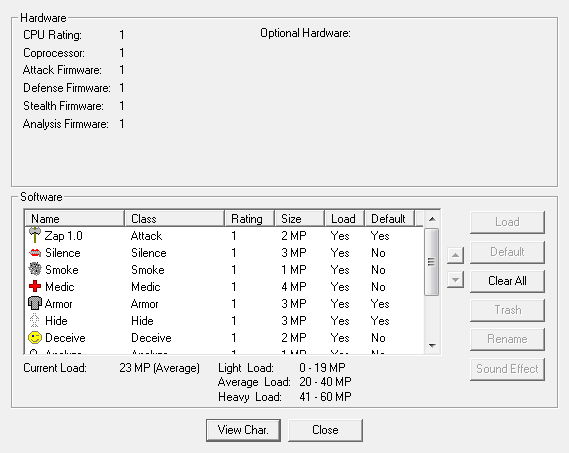
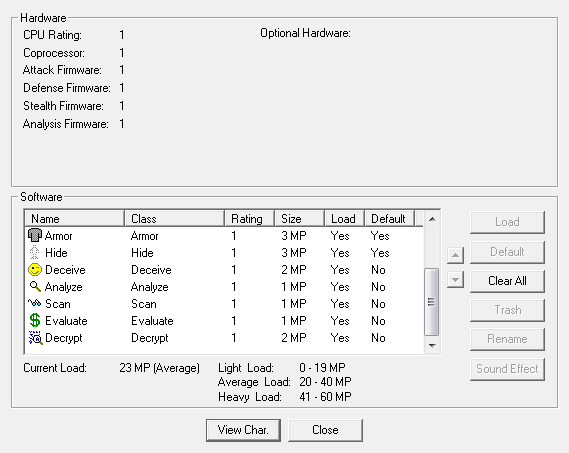
Next up is our cyberdeck. It gives our hardware rating and any add-ons at the top, and at the bottom lists our software and lets us manage what we load on our deck for any given run.
For the hardware side, our Attack, Defense, Stealth, and Analysis firmware affects our chance of success at given actions, just like our skills do. Our CPU has two functions: it increases the Load we can maintain (see below) and it caps all our other firmware. Any firmware rated higher than our CPU only runs at a rating equal to our CPU, until we upgrade our CPU. Our Coprocessor only functions to increase Load.
All of our programs are loaded onto our deck at the moment, though you'll notice only Zap 1.0, Armor, and Hide are marked Default. That's because most programs are meant to be used at a given time in the Matrix and then be done. For instance, if our icon is damaged, we run Medic to repair it, and then Medic stops running. Some programs are meant to run all the time, though; Armor is basically our passive defense against damage, and Hide is our passive defense against being detected. Additionally, Attack programs are running by default to represent them being 'at the ready', so we can attack other icons immediately and repeatedly. I'll get more into what our programs do once we're in the Matrix.
Our Load, finally, is how much our deck can have running. Our max load is 60 MP, the top end of a Heavy load. Higher rated programs take up more MP, so in that way our software is capped by our CPU and Coprocessor. As for the difference between Light, Average, and Heavy, a Light load gives a +1 bonus to our rolls in the Matrix, and a Heavy load penalizes us by 2. Thanks to HenryEx for pointing this out!
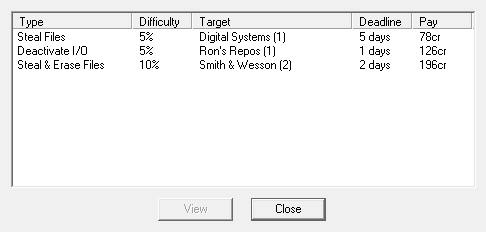
This is our Contracts page, where we can see the details of the contracts currently on offer to us by anonymous employers. There are several different types of contracts, so we'll go over those as we take the jobs. Difficulty is mostly determined by the target system's rating, which in the number in parentheses under Target. Deadline is how long we have to complete them, and Pay is how much we'll get for completing the contract.
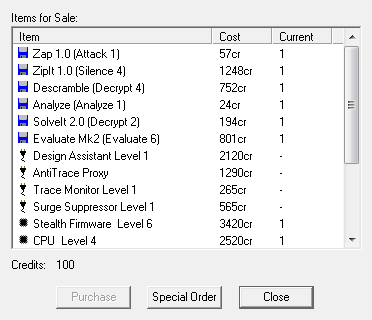
Here we have the marketplace, where we can buy software and hardware. The ratings on offer are loosely based on your reputation, but as you can see, there's a lot of randomness. Our starting 100 nuyen can't buy much besides rating 1 software, but as we get more money we'll be able to upgrade our cyberdeck fairly effectively. If you want a certain something, and just hate the randomness of the market, you can always place a special order...
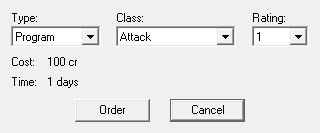
With a special order, you can specify any piece of hardware or software, at any rating. There are two major downsides: cost and time. For instance, compare the cost of 100 for any special order software at rating 1 with the rating 1 software items in the market. It's a small difference there, but as the ratings get higher, the prices increase exponentially. Special orders also take time. If we did order that rating 1 piece of software, we wouldn't actually get it until tomorrow. Again, it doesn't seem like much, but at higher ratings, expect longer and longer wait times.
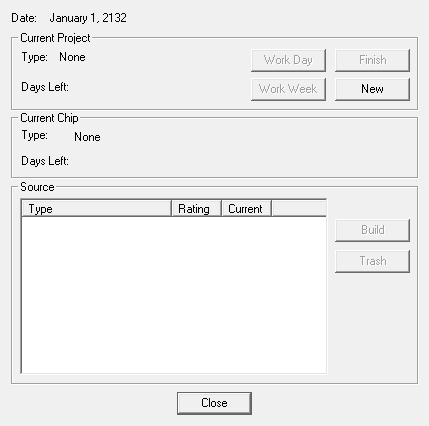
Next up is our Projects menu, where we can work on programming software and designing hardware. It takes much more time to design things yourself, but it doesn't cost you anything but rent each month (though to actually get a piece of hardware after designing it, you need to buy a Chip Burner). With only two skills governing the caps, you can get a lot of bang for your skill points as well as your bucks. After all, having a rating 10 Programming skill lets you make ANY program up to rating 10.
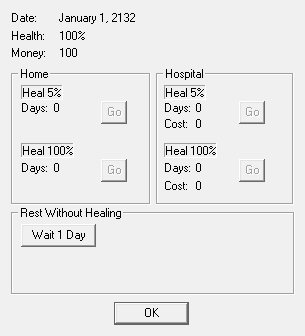
And then we have the Rest and Recuperate menu. Resting, either in your own bed or in a hospital, is the only way to heal physical damage. Resting in a hospital is more effective, but costs money each day. Resting in bed won't heal very much, but it only costs you time and rent. You can also let time pass in this menu, which is useful if you're waiting for new contracts, new marketplace inventory, or for a chip to burn.
We can't go into the Matrix until we have a contract, at which point 'Enter the Matrix' will take you straight to the server you're targeting. Game Options are just for saving, loading, or quitting your game.
Tune in next time when we actually take our first trip into the Matrix!